BOOKS FOR AUTONOMOUS TEACHERS– Chuck Sandy

Anyone who knows me knows I’m a reader, and anyone who’s a reader knows that reading what you’ve chosen to read is an act of rebellious autonomy.
Reading makes you think, and the more you think, the more you’ll question the way things are. You’ll then start wondering how things could be different and before long, you’ll be making changes in the way you live, think, and teach.
I give you fair warning: if you read the books I’m going to tell you about, you’ll no longer look for ways to encourage learner autonomy. Instead, you’ll wonder how anything less could be called teaching and why school systems the world over work so hard to discourage autonomous teaching and learning. Allow me to introduce you to some old friends.
……
Teaching As A Subversive Activity – Postman & Weingartner
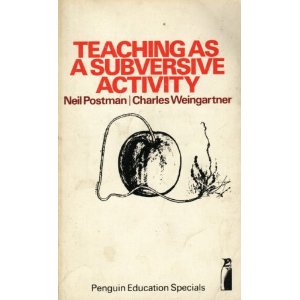 When Neil Postman and Charles Weingartner wrote Teaching As A Subversive Activity in 1969, it was news. It still is. This book is as valid an attack on lock-step teaching and unimaginative schooling now as it was when they first declared that, “There are trivial ways of studying language which have no connection with life, and these we need to clear out of our schools.”
When Neil Postman and Charles Weingartner wrote Teaching As A Subversive Activity in 1969, it was news. It still is. This book is as valid an attack on lock-step teaching and unimaginative schooling now as it was when they first declared that, “There are trivial ways of studying language which have no connection with life, and these we need to clear out of our schools.”
This is something I remind myself of every single day. Above my desk is a card on which years ago I copied these three questions from the book:
What am I going to have my students do today?
What is it good for?
How do I know?
Reflecting on these questions before teaching a class or writing an activity has forced me to constantly rethink the way I teach, the activities I write, and the reasons I’m a teacher. You might like to try this yourself.
On Becoming A Person - Carl Rogers
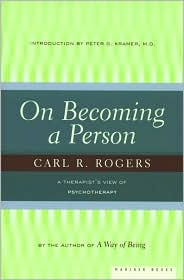 Roger’s beautiful book opens with these words
Roger’s beautiful book opens with these words
“I speak as a person, from a context of personal experience and personal learnings”
To offer yourself, as you are, to a group of learners is the greatest gift you can offer them. This is at the center of Roger’s work and at the core of what I believe about authentic teaching and learning.
For me, being a teacher means constantly working to become who I am while openly sharing that journey with others. My experience has been that the more I offer who I am on any particular day, the more likely it is that others will do the same. Under these conditions, real learning and teaching become more possible.
This is not an easy thing to do, and so it’s only right that On Becoming A Person is not easy reading. It asks questions like: “What is the meaning of personal growth? Under what conditions is growth possible? How can one person truly help another? Is it really possible to teach anyone anything?” Rogers grounds his work in a lifetime of practicing psychology and teaching to share the answers he’s arrived at. In the process of reading, you’ll likely discover your own.
A Place To Stand: Essays for Educators in Troubled Times – Mark Clarke
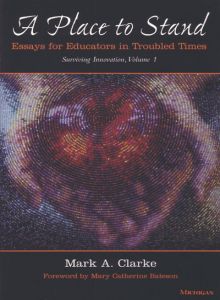 Like many teachers, you might be experimenting with non-traditional ways of teaching. In Clarke’s words you’re “a change agent” promoting not just change in your learners as you create conditions that make autonomous learning more likely. You’re also promoting change in the way things are done. Fantastic!
Like many teachers, you might be experimenting with non-traditional ways of teaching. In Clarke’s words you’re “a change agent” promoting not just change in your learners as you create conditions that make autonomous learning more likely. You’re also promoting change in the way things are done. Fantastic!
Be ready, though. People are going to notice, and not all of these people are going to be happy. I know this from hard experience. Reading Clarke’s book has saved my career more than once. If you’re doing non-traditional things in your classroom, get this book and take the following advice to heart:
Invite others in to see what you’re doing in class, but be sure to prepare these observers for what they’re going to see. Then, as your students are huddled up around laptops gathering data, while others are in some other corner practicing their presentation, while still others are doing something else all together noisily, be ready to “help others see the structure and order of events and how these build upon each other toward a coherent experience for the learners.” Then be ready to be accommodating. Sure, I’ll get them to quiet down. Of course, we’ll use the textbook sometimes. Yes, I’ll make sure students learn what we’ve all agreed needs to be covered. Then smile, make sure you do those things, and get back to work.
How Children Fail – John Holt
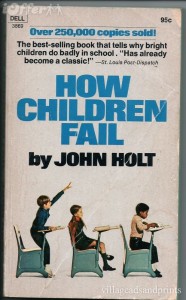 I’ll let Holt speak for himself, but as you read, replace the word children with the word teachers and the word learning with teaching. Watch what happens.
I’ll let Holt speak for himself, but as you read, replace the word children with the word teachers and the word learning with teaching. Watch what happens.
“Schools assume that children are not interested in learning and are not much good at it, that they will not learn unless made to, that they cannot learn unless shown how, and that the way to make them learn is to divide up the prescribed material into a sequence of tiny tasks to be mastered one at a time, each with its appropriate ‘morsel’ and ‘shock.’ And when this method doesn’t work, the schools assume there is something wrong with the children — something they must try to diagnose and treat.”
“We who believe that children want to learn about the world, are good at it, and can be trusted to do it with very little adult coercion or interference, are probably no more than one percent of the population, if that … My work is to help it grow. ”
That’s my work, too, and since you’ve read this far, it’s probably your work, too. The good news is, we’re no longer the one percent. We’re a movement whose members do not quite make up a majority yet, but we’ll get there in my lifetime. I’m sure of it.
Breaking Rules – John F. Fanselow
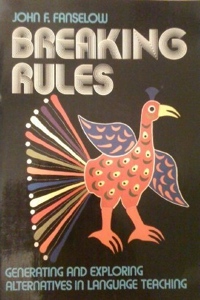 Twenty-five years ago, this book set me free to become the autonomous learner/teacher I’m still becoming. It helped me see what was really happening in my classes, while also giving me permission to explore alternatives. John’s premise is that, “Only by engaging in the generation and exploration of alternatives will we be able to see. And then we will see that we must continue to look.”
Twenty-five years ago, this book set me free to become the autonomous learner/teacher I’m still becoming. It helped me see what was really happening in my classes, while also giving me permission to explore alternatives. John’s premise is that, “Only by engaging in the generation and exploration of alternatives will we be able to see. And then we will see that we must continue to look.”
I’m still looking, and what I see gets me looking more. My teaching is an ongoing experiment. I never do the same thing the same way twice. This way of being has extended into every aspect of my life. I live for learning and radiate that energy. I’ve got these old friends like John F. Fanselow to thank for that.
If you’d like to experience some of this buzz, I invite you to join me in taking Breaking Rules Live, a five-week online course led my John F. Fanselow himself. I’ll be taking the course. It’s a never-ending journey, and you’re welcome on it.
Editor’s Note: iTDi’s Breaking Rules Live course with John F. Fanselow, begins on November 10th. For more information and registration, please click the link above. A limited number of seats are still available.

